
Inquiry approaches to Climate, Weather, and Energy in the 6-9 Classroom
May - July, 2011
The onsite portion of the workshop is complete (June 13-June 17, 2011)
Diigo link sharing website associated with the class. Anyone can view, request to joint.
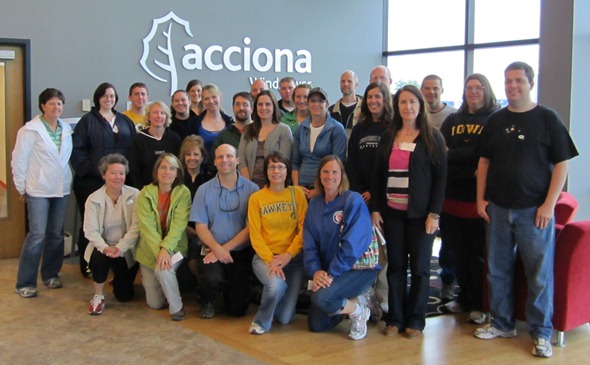
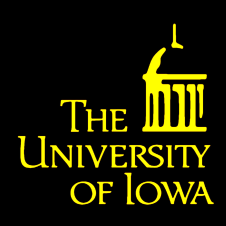 |
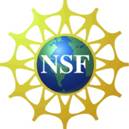 |
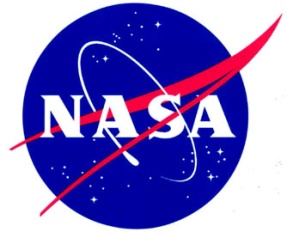 |
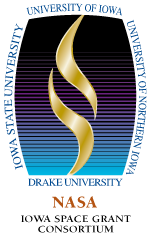 |
 |
|||
This material is based upon work supported by the National Science Foundation under Grant No. 0748602.
Any opinions, findings and conclusions or recomendations expressed in this material are those of the author(s) and do not necessarily reflect the views of the National Science Foundation (NSF).
When: Monday, June 13 through Friday, June 17, 2011
(Arriving on Sunday, June 12 and leaving Friday, June 17)
Where: University of Iowa, Iowa City, IA
What: This workshop is designed to be a professional development workshop for middle-school science teachers. All expenses are paid for participants including room, board, travel, 2 graduate credits, and stipends. The goal of this workshop is to provide teachers the opportunity, background knowledge, and confidence to improve student outcomes regarding climate, weather, and energy. Teachers are given access to sample curriculum, content experts, field trips, and hands-on practice at integrating simple scientific models that support conceptual understanding in Climate, Weather, and Energy (CW&E).
With the aide of workshop staff, participants will design simple scientific models that support the participant’s existing curriculum goals. These models will range from non-technical (such as drawings and text) to versions that require some computer usage (such as graphing). Although climate and weather models are quite complex, workshop experiences will isolate elements of these models so they can be understood and effectively incorporated into the middle school science classroom.
Why:
The National Science Education Standards (NSES) state that the concepts of energy transfer, energy conservation, and issues relating to the environment are critical topics for middle-school students. Standard documents demand that curriculum presents science concepts in ways that resonate with students, encourage problem solving, and lead to understanding of the way science works. Highlighting the deep connection between energy and climate can provide teachers with an effective way to incorporate the topic of energy into a commonly discussed societal issue.
The NSES also emphasizes the importance of introducing students to the concept of scientific models. At the University of Iowa we support scientific models for research and classroom learning. Both historical scientific breakthroughs and many recent scientific results are based on models, including theoretical, conceptual, and computational models. For example, students may be familiar with weather forecasts on television and the Internet. However, most probably do not understand or recognize the embedded scientific concepts use in these forecast models. Our research suggests that making the connection between the classroom concepts and their use in scientific models improves student outcomes. We believe that learning opportunities that examine and explain how models are built and revised help all learners to understand the relative strength of the knowledge claims made by scientific models.
More Details About the Workshop:
- The workshop leaders will use an inquiry-based teaching approach to increase content and conceptual knowledge of participants with respect to Climate, Weather, and Energy (CW&E).
- Workshop will explain and demonstrate how conceptual, theoretical, and computer simulation models are used in the fields of CW&E.
- Participants will have the opportunity to design experiments to answer their own questions about CW&E topics, describe their understanding of science concepts through the development of simple scientific models, and interact with expert scientists in the field.
- Workshop leaders will summarize available online teaching resources in the field of CW&E
- Workshop participants will be given time and assistance in incorporating CW&E into their existing or emerging school curriculum.
- At the end of the workshop, we expect participants to have increased confidence at incorporating simple scientific models into their curriculum to help student learning through the process of making their own representations and explanations of Earth’s systems.
Expectations of the participant
- Perform pre-workshop reading assignment and a short corresponding reflection essay
- Attend 5 day workshop at the University of Iowa Campus
- Attend follow-up conference call in Spring 2011
- Develop/modify a unit on climate, weather and/or weather consistent with the approach of the CW&E workshop
Benefits for the participant
- 2 paid graduate credit hours through University of Iowa Distance Education
- A Stipend of $100 for attending the follow-up spring conference call. Date and time to be negotiated.
- Interaction with practicing scientists, engineers, and educators in the fields of CW&E
- Room, board, and travel paid. This is a $1000 value for each participant including the graduate credit hours!
- Rooms are single dorm rooms. Meals provided are a combination between University Dining Service and a personal meal allowance.
For more information, please email Charles Stanier [ charles-stanier@uiowa.edu ] and
Morgan Yarker [ morgan-e-brown@uiowa.edu ]
|
About the workshop leaders:
Charles O. Stanier is member of the Department of Chemical and Biochemical Engineering, and a member of IIHR Hydroscience and Engineering at the level of assistant research engineer. He joined Iowa in 2004. His research interests are in fundamental and applied issues in air pollution, climate science, and aerosol science. Dr. Stanier leads investigations focused on these systems using computer models as well as laboratory and field studies. These projects focus on the prediction, understanding, measurement, and health effects of air pollutants, greenhouse gases, and aerosols. He received an NSF CAREER award in 2008, and the Walter R. Rosenblith young investigator award of the Health Effects Institute.
Morgan is a PhD candidate in the Science Education program at the University of Iowa. She has a B.S. in meteorology and a M.S. in atmospheric science, where she worked with computer forecast models. She spent part of her graduate studies as a fellow for the National Science Foundation where she taught 8 th grade physical science. Though she loves forecasting and studying the atmosphere, her experiences as a fellow led her to realize her passion is teaching science and math. She is now in her third year as a graduate student and looking forward to finishing her dissertation and beginning her career as a science educator in the coming year.
| Stanier, CBE Website |
| CBE Home |